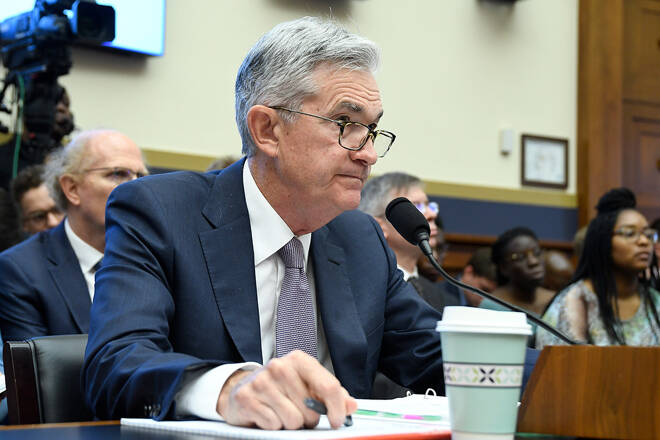Advertisement
Advertisement
Powell Congressional Testimony: Likely to Address Rising Rates, Surge in Inflation, Need for Fiscal Stimulus
By:
In his testimony this week, Powell may reiterate his suggestion that any inflationary spike to the upside over the near-term will be transitory.
Savvy investors are preparing to hear from Federal Reserve Chair Jerome Powell in his semiannual monetary policy testimony before Congress on Tuesday and Wednesday. Powell will answer questions from the Senate Banking Committee on Tuesday, and the House Financial Services Committee on Wednesday.
In recent speeches, Powell has toed the company line, reiterating that Fed policymakers would maintain an easy monetary policy stance in order to support the economy as it emerges from the COVID-19 pandemic. And recent labor market data supports this posturing given the series of disappointing weekly initial jobless claims reports and the disappointing December and January monthly jobs data. With the jobs markets under extreme strain due to the pandemic, it’s hard to make a case for the Fed moving toward a more aggressive policy so its current opinion should remain in place as a safety net.
Analysts agree that the Fed has little wiggle room at this time. Meanwhile, the Fed faces challenges that could upset the balance it is striving to achieve with rates moving higher and the possibility of higher inflation.
“Powell will likely note recent progress in the data but reiterate that the economy is far from fully recovered, thereby defending accommodative monetary policy,” Bank of America economist Michelle Meyer said in a note Friday.
Powell and his colleagues are already on record suggesting they would like to see inflation that averages 2% over time, implying they could tolerate a slightly higher mandate to offset the years of persistently low inflation. However, recent comments from Fed speakers suggest they aren’t certain on how much inflation the economy could width stand. Early concerns could become serious issues given that higher inflation tends to drive interest rates up as well as commodity prices, which could curtail the pace of the U.S. economic recovery if they occur too fast.
“There is a delicate balance: strong growth could prompt a faster rise in rates, driving up borrowing costs and weighing on risky assets, limiting upside economic growth,” Meyer added.
In his testimony on Tuesday and Wednesday, Powell may reiterate his suggestion that any inflationary spike to the upside over the near-term will be transitory. He may emphasize that the inflation surge the economy is experiencing on a year-over-year basis is the result of the huge recovery we are seeing relative to the massive decline in the economy a year ago. He may also mention that inflation will dissipate later in the year when compared to longer-term inflationary trends.
“We believe [Powell] will reiterate that now is not the time to be discussing an exit strategy for monetary accommodation considering significant uncertainty,” Nomura economist Lewis Alexander wrote in a note Friday. “Moreover, he will likely seek to downplay any concerns over inflation given upcoming base effects in Q2, the relatively weak December and January employment reports will offer Powell an opportunity to highlight the significant progress the labor market still needs to make before approaching ‘full employment.’”
Finally, “Powell may also use his testimony to reiterate his call for additional fiscal support from Congress to augment the support offered through the Fed’s policies,” according to Emily McCormick from Yahoo Finance.
During his press conference following January’s Federal Open Market Committee (FOMC) meeting, he emphasized fiscal support, calling it, “absolutely essential” to the economic recovery. Although Powell didn’t specifically mention President Joe Biden’s $1.9 trillion stimulus package, the size of that coronavirus relief bill would work well with the FOMC’s current monetary policy strategy.
For a look at all of today’s economic events, check out our economic calendar.
About the Author
James Hyerczykauthor
James Hyerczyk is a U.S. based seasoned technical analyst and educator with over 40 years of experience in market analysis and trading, specializing in chart patterns and price movement. He is the author of two books on technical analysis and has a background in both futures and stock markets.
Advertisement
